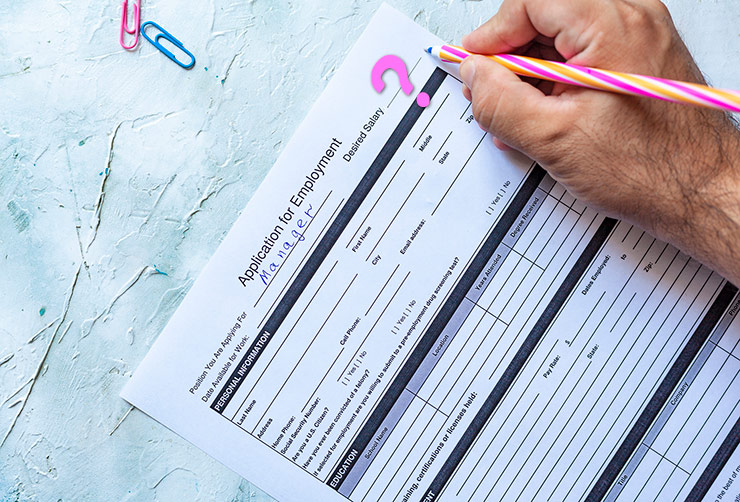If you’ve lost your job, are trying to leave a toxic workplace, or simply want to start a new career you feel overwhelmed. In a panic, you may think “I need a new job and don’t know what to do!”
Take a deep breath and stave off the anguish. This guide breaks down the entire job search process — from finding a new position to signing a job offer — one management step at a time.
What Is The First Step To Finding A New Job?
The first step to finding a new job is having a quick self-analysis session. Make a list of your career goals and objectives first. Then do a tally of your most marketable skills and core competencies. Your goal at this point is to create a job search mindset that will help you power through the job application and interviewing process.
Next, start working on your key assets — a resume, a cover letter, and an optimized LinkedIn profile.
How To Find A New Job You’ll Love: Step-By-Step
Just like any other process, job search activities need structure. Otherwise, you’ll feel overwhelmed and demotivated just too soon.
To get a new job fast, you will have to:
- Create a list of your top soft and hard skills
- Update your resume with the most recent information
- Create or refresh your LinkedIn profile
- Make a list of job sites, you’ll check religiously
- Prepare a set of customizable cover letters
Create a List of Top Soft and Hard skills
Soft skills are personal qualities and attributes, which allow you to effectively work with others. These skills often relate to your emotional intelligence — your abilities to communicate well, show empathy, and adapt your behaviors in various social situations.
If you need ideas for your resume, check out these guides:
- Best leadership skills
- In-demand organizational skills
- Interpersonal skills examples
- Conceptual skills for a resume
- Critical thinking skills examples
- Self-management skills
Hard skills refer to specific technical skills and industry knowledge, required to perform a particular job or task. These skills are often measurable and quantifiable and can be learned through formal education or on-the-job.
If you need ideas for your resume, check out these guides:
- Management skills
- Technical skills
- Administrative skills
- Analytical skills for resume
- Business acumen skills
Finally, your soft and hard skills can be transferable i.e. such that can be applied across industries and professions. These skills are often developed through previous work or life experiences, rather than formal training alone. For example, you can learn great time management skills both by working in the delivery industry and by being a project manager.
Transferable skills are highly valued by employers, as they demonstrate an individual’s versatility and adaptability.
Your task: Create a three-column spreadsheet, where you list all your soft, hard, and transferable skills.
Update Your Resume
Chances are, you’ve developed new skills, gained lots of experience, and formed some new career goals since you last looked for a job. Your resume should reflect all of these changes.
Start by updating your work history and education as needed. Don’t just focus on new entries. Update old ones as well. Take out information that isn’t interesting, and add items that show your recent achievements.
Check these resources for extra resume writing help:
- How to write a resume that gets you hired
- Resume sections: how to organize them
- Resume header: styling tips and examples
- Resume Summary: 6 tips and examples to swipe
New to the Workforce? Prepare A Strong Entry-Level Resume
No matter what entry-level job you want to apply for, it all starts with your resume. To get your resume into the ‘read again’ pile, you need to know how to structure your resume to make it easy to read and apply the correct layout that promotes your strengths.
There is no big secret about why some entry-level resumes are more effective than others – in most cases, the job candidate simply picked the right resume format.
If you were to pick a chronological resume format that a more seasoned and experienced worker would use, you may end up burying your competitive strengths and transferable skills.
A functional resume format — one focusing on your skills — can work better for you. You can also try a combination resume, which has a greater emphasis on skills, but still layouts some of your work and school experience chronologically.
To make a great entry-level resume:
- Open with a strong resume summary, showcasing your main skills
- Group related short-term jobs together into one entry
- Add a bulleted list of duties and accomplishments for each
- Include relevant academic research, volunteer work, and internships
- Emphasize your education (GPA, dean’s list, main course work, etc).
- Write a complimentary cover letter, further explaining your motivation
Need more context? Check these resources next:
Refresh Your LinkedIn Profile
Your job search efforts are incomplete until you create an optimized LinkedIn profile. There are so many hiring managers and recruiters that use LinkedIn to connect with potential employees. So without a profile, you miss a ton of great opportunities.
The best part? LinkedIn allows you to run a stealth job search while being employed. Use some of the platform’s privacy features such as:
- Open to Work badge — shown to users with a premium LinkedIn recruiter account (but not people in your organization).
- Privacy for joined groups — if you’ve joined several networking or job search groups, you can configure to exclude this information from your profile or recent activity.
- Configure who sees your profile edits — if you’ve been in the same company for a while, your profile probably got “rusty”. But major updates can signal to your current employer that you are looking for another job. LinkedIn lets you opt-out from sharing profile changes with your connections.
Then go on and update your LinkedIn summary. Then add several new accomplishments for your current position. Update training, certification, and accolades. Lastly, re-optimize the skills section on your profile to better reflect your current skillset.
Your LinkedIn profiles give you the ability to build a positive image for a prospective employer without directly telling that you are ready for a career change.
Here are some quick tips for building a stronger personal brand on LinkedIn:
- Share posts about your latest projects and accomplishments on your feed.
- Curate industry news and best practices with your commentary.
- Participate in industry discussions to show your expertise.
- Ask select members of your network to provide you with profile references (a colleague or a mentor, but not your boss).
Remember: The key here is to improve your visibility on the platform and help a casual profile visitor shape a better impression of your professional acumen.
As a precaution, however, turn off public notifications on your profile. This will prevent your employer or the HR team from seeing the flurry of your activities and wondering what prompted that.
Apart from LinkedIn, consider updating other assets you have such as your portfolio, personal website, or profiles in other professional communities (e.g. Behance, GitHub, Dribbble, etc).
Start Job Hunting
With a fresh new resume and an updated LinkedIn profile, you’re all set for job applications. LinkedIn will recommend open vacancies, based on your profile, so that’s the first place you should check.
Next, consider other popular job sites like Indeed, Monster, and ZipRecruiter. The definite advantage is that each has a ton of fresh jobs. The downside? Everyone else is using them, so the competition can be steep.
If you don’t want to virtually rub elbows with hundreds of other applicants, try some alternative job search ideas.
Browse Niche Job Boards
Instead of going with ultra-popular options, pick niche job boards, sharing vacancies in your industry only.
Here are our top picks:
Best entry-level job boards
- College Recruiter — full-time and part-time jobs, internships.
- Handshake — a platform connecting college students with employers.
- WayUp — another match-making platform for recent grads and employers.
- One Day One Job — a job board for college students and recent graduates
- LinkUp — a job search engine, aggregating vacancies from all major websites.
Best tech job boards
- Wellfound (former AngelList jobs) — jobs with the biggest tech brands
- TechFetch — full-time and part-time IT jobs
- Authentic Jobs — freelance, full-time, part-time, and internship offers
Best media & marketing job boards
- Media Bistro — a roster of creative job positions in design, marketing, and editing
- Folio — a good selection of jobs in the publishing and news industries
- Public Media Jobs — journalism and editorial jobs
- American Marketing Association — fresh opportunities for seasoned marketers
Best hospitality job boards
- Hcareers — nationwide jobs in the hospitality sector
- Culinary Agents — best positions in the restaurant industry
- Poached Jobs — full-time and part-time restaurant jobs
Network In Online Communities
You’ve probably heard about the so-called hidden job market.
These are positions that are never advertised through traditional channels. You may learn about them through word of mouth or by participating in niche communities. This method is especially useful if you are in a field that is small or involves some very specialized knowledge.
Take part in online sites, apps, or live groups that relate to your profession. You may learn about job opportunities. There will also be opportunities to pitch your own talents. Here are a few example groups:
- GrowthHackers — for marketers
- Behance — for designers
- Project Management Community by PMI — for project managers
Also, don’t neglect LinkedIn and Slack community groups in your industry. Both offer a great place to connect with prospective employers and recruiters. Speaking of which…
Reach Out To Recruiters Directly
It’s absolutely worth contacting recruiters directly. Recruiters have the ability to connect you with job opportunities that will never be advertised publicly. There are many organizations that simply never use job boards or other online platforms. Instead, they rely on recruiters and other professional networks for their staffing needs.
You can do this through email, sending a request to connect on LinkedIn, or making an approach at a professional event.
Read more about how to reach out to recruiters and get the right conversations going!
Attend Industry Events And Meetups
You can’t beat meeting up with people in your field to jumpstart your job search. But the key is knowing how and where to find these gatherings.
Start with online platforms for arranging in-person meetups. Of course, one of the most popular is Meetup. You can also check out Eventbrite or Citysocializer. Your local chamber of commerce may also host regular events.

Does your town have a local co-op for entrepreneurs, a small business hive, or a coworking space? It’s very common for these spaces to hold networking events. Research and add the most promising opportunities to your calendar.
Next, don’t forget to prep up for attendance.
Polish or craft your elevator pitch, print out or QR code your resume, and have a couple of physical business cards in your pocket if you are still using them. Alternatively, you can create a simple online card website and share a link to it with anyone interested to learn more about your work.
Also, don’t forget about collecting contact information from others! Offer a prospective employer to immediately connect on LinkedIn. Then ask for their email too and send a quick follow-up message the next day.
Pitch For Remote Jobs
Thanks to remote work becoming the norm, you can take your job search worldwide. You’re simply no longer tethered to a single, geographical location.
Browse popular remote work job boards such as for active vacancies:
The only challenge will be convincing potential employers that you can pull off working remotely.
Approach Companies You Admire
If you don’t have a list of “dream employers”, you should make one. This aspirational list can be a source of motivation, and help you focus on finding the ideal job. However, if you simply write your list of top employers down and forget about it, then nothing is going to happen.
Take the next step and write a cold pitch. Many companies are open to hearing from the right talent. At worst, they will simply file your resume away until the right job opens. At best, you may find that they create a position to make the best use of your abilities right away.
You won’t regret writing a letter of interest. Chances are, you will get a positive response as long as you are polite yet direct.
Add Customized Cover Letters To Every Job Application
In your desperation to find a new job as quickly as possible, you may be tempted to just click auto-apply with your LinkedIn profile or mindlessly dispatch a resume only.
Don’t do that. Instead, slow down and consider adding a cover letter to each job.
Industry data suggests that 65% of recruiters rank cover letters as important. Cover letters are used both as a way to pre-screen candidates. The less motivated people will skip through this step, meaning you’re more likely to stand out.
Moreover, many organizations view cover letters as a “courtesy gesture”. In addition to a professional introduction, applicants are expected to share information about their professional background.
To produce custom cover letters 2X faster, create a standard cover letter outline you’ll use as a reusable template.
Then customize each cover letter by:
- Addressing it to the right person and company
- Highlighting skills, based on the job description
- Referencing some unique points about the company (e.g., their products/services, recent news, or corporate values).
If you’re struggling to find the right words, check our growing collection of sample cover letters for different industries and professions.
FAQs About Job Search
When it comes to job search, no question is silly. So we’ve gathered up some more pressing questions job seekers have and prepped some actionable answers to them!
Where Can I Find A Job Other Than Online?
If you’re willing to get out of your house, you can absolutely find work without getting on the internet.
Here are some great offline ways to find a job:
- Attend job and career fairs
- Visit a local employment office
- Mingle at the union halls
- Use public job boards at stores and local colleges
- Apply in person to local businesses
Of course, you could be limiting yourself if you disconnect entirely. Consider keeping an open mind and pursuing job search options both on and offline.
Is It Worth Applying For An Entry-Level Job That Requires Experience?
The choice is yours. If you don’t mind a compromise in terms of pay, definitely go for it! If not, keep networking via LinkedIn and browse other jobs.
But if you really like the job but don’t have the X years of experience, you can still land an interview by:
- Using a functional resume format
- Focusing on transferable skills
- Highlighting your personal projects and schoolwork
- Placing your digital literacy in the limelight
- Mention your internships and part-time work
Your goal is to format your application in a way that draws the readers’ attention toward your core competencies and skills, rather than the number of formal years of experience.
How Do I Find A New Job While Still Employed?
Most of us will start looking for a new job while still employed. Since job search can drag on, it’s best not to rush with filing a resignation letter.
On the other hand, if you are casually browsing, rather than actively searching, you don’t want your colleagues or the boss to know either.

Here’s how to find a new job discreetly:
- Update your LinkedIn profile
- Focus on your personal brand
- Keep your resume private
- Attend networking events
- Arrange stealth job interviews
- Don’t come too over-dressed to the office
- Stay discrete during work hours
What To Put For Desired Salary in Job Application?
When you try to determine what to put for “desired salary”, you have three options. First, you can write “negotiable” in the space you are asked to provide your salary. Or you can provide an industry range. Finally, you can provide an honest answer — your target figure.
There are some valid reasons to consider all three options.
By writing “negotiable” in the desired salary line, you ‘punt’ the question over to the job interview. Doing so helps you negotiate your salary in person. As researchers found, in-person negotiations often allow building a better rapport with the other person, which, in turn, leads to better outcomes.

If a job application form only supports numeric entries for the ‘desired salary’ field, provide a salary range. The ideal number should be in-line with the industry medians. But also take into consideration the following:
- Your experience
- Special skills or training
- Whether you will have management responsibilities
Here are must-know tips for determining an appropriate salary range:
- Check similar job listings: focus on those in your area. Write down the salary ranges you encounter and use them in your application.
- Check salary comparison websites: Glassdoor and PayScale aggregate salary information across an array of employers, roles, and locations.
- If your current job is in the same field, you can use your current salary as a bit of a guide. Unfortunately, this doesn’t work if you are changing careers or you are currently underpaid.
Finally, you can put down a precise number for the “desired salary”. But it’s the least desirable option. This can mean you lose your power to negotiate your base salary, especially if you’ve written your current salary as a reference.
You may be offered a bit more money, but there is a good chance that you could have negotiated for more if your hand had not been forced. Thus, resort to this option only if you have no leeway at all.
What If My Desired Salary Is Too High?
What can you do if you overshoot the mark? You may put down the salary range and find out later that it’s higher than the industry standard. Likewise, you may simply hear back from the hiring manager that you’ve asked for too much money. What’s then?

You can recover from your ‘salary fiasco’ during the job interview. Here’s how.
Start by asking about the full compensation package. You may be able to find some points of negotiation there. For example, mention that you are willing to take a lower salary due to the availability of some worthwhile benefits such as PTO.
Also, consider doing some extra company research before the interview. Enter the negotiation with a good range of compensation for someone with your experience. Perhaps you can make a case for the salary you requested. It also pays to be honest and direct if you truly cannot take a salary below a certain amount.
Finally, try to move the conversation on to other things. This way, the disagreement over salary isn’t the last thing on the interviewer’s mind. Close the interview by reiterating your interest in the position. But state that you need some extra time to consider the compensation and offer to have a follow-up after the interview.
What If the Employer is Ghosting Me After a Job Application?
Sadly, employer ghosting happens a lot. Over 77% of employers ghosted a job candidate at least once over the past year (!!!). What’s even more maddening is that 10% of job seekers said that a recruiter ghosted them after making a verbal job offer.

There’re several reasons why you may be ghosted by the employer:
- The current job market realities. The employment market has been anything, but steady for the past several years. Companies hire (and lay off) employees en masse. Due to high workloads, some employers admit to not being able to process them effectively and fail to get back to prospects promptly (or at all).
- Applicant tracking software. ATS is hardly new, but it got more popular over the last few years as companies digitize their HR departments. Per Capterra, 75% of recruiters use some sort of software for processing job applications. Respectively, if your resume isn’t optimized to glide through the software, it may never actually land in front of a human employee. Hence, no reply whatsoever.
- Ignoring instructions. In a similar vein, your resume and cover letter may be auto-discarded if you failed to follow a simple, yet mandatory step in the recruiting process e.g. use a specific email title for submission or use the correct document format. If you didn’t bother to follow the instructions, some employers may not bother answering you.
How To Reduce The Chances Of Job Ghosting
To prevent no-response scenarios, take proactive steps to minimize the possibility of a stalled conversation.
You can substantially reduce the risks of being ghosted by an employer by following these steps:
- Always confirm the next steps. Ask the recruiter to give a quick walkthrough of their company’s decision-making process. What is their standard timeline for answering? Should you expect a second interview or prepare for another type of meeting? Who’s the next person to contact? Your goal is to get a better idea of how the hiring process moves and find out if there’s any way to help keep things moving forward.
- Follow-up after the interview. After each interview, have a quiet moment to access your feeling about the opportunity and your performance during the interview. If you’re interested in the opportunity, send a short thank-you note to the interviewer (80% say that take these into account when making hiring decisions!), connect with the person on LinkedIn, and add a calendar memo to follow up with them in 5 business days for a status update.
- Reinitiate contact. You’ve sent the thank-you email, then a follow-up, but still heard nothing. Perhaps the interview process is taking longer than expected. Don’t be afraid to call or email for the second time. This way you can get your yes or no answer faster and then move on to other job applications.
How Long Do You Have To Accept A Job Offer?
In most situations, you are expected to accept a job offer within 48 and 72 hours of receiving it. There are a few exceptions to this. A company might have an urgent need and insist on getting an answer sooner. On the other hand, if a job requires relocating or other major changes, you will likely be given additional time to consider it. The key is to read the offer carefully and clarify exactly when they expect to hear back from you.
If you are negotiating multiple job offers, be forthcoming with the recruiter. After receiving a written job offer via email, provide them with a short ‘thank you’ email within 24 hours tops, and tell them that you need some time to consider the job offer.
What To Do When You Have Multiple Job Offers?
First of all, give yourself a good pat on the back! You did super well with all the interviews and the most stressful part is over.

But before you go all festive, make sure that:
- You have received multiple written job offers. A ‘congrats, we want you onboard’ call from an HR doesn’t count as an actual job offer. Because an employment offer that is not put in writing can be easily retracted or changed at any time. So make sure that you receive a copy of a written offer via email, clearly stating all the terms.
- You are not canceling other interviews. That can be tempting, sure. But don’t bail on other interviews even if you already have 2+ job offers, especially if one (or all) is non-written. In fact, having more job offers on the table can be better for you as this way you’d be able to truly zoom in on a good role.
At this point, your goal is to:
- Complete all the remaining second interviews
- Wait for all the written job offers
- Ask the recruiters for some time to make the final decision.
If you are considering other offers, you can also bring that up in the conversation with your front-runner as a prompt to further salary negotiations. According to a Robert Half survey, 6 in 10 job seekers have received two or more offers at the same time, so most recruiters won’t act all surprised upon hearing that. Instead, most will often suggest scheduling a follow-up meeting to further ‘sell’ you the idea of choosing their company or talk over the exact offer terms. It’s up to you to accept or decline the negotiations at this point.
How Do I Select The Best Job Offer?
Once you’ve secured some ‘think’ time, research each job on offer and decide whether it is a position you would gladly accept over another. You want to have a choice between comparable positions or at least jobs in different areas of your expertise or interest with similar compensation.
So here’s how you should deal with multiple job offers:
- Determine how each offer fits your career path. Does the role align with your current career goals? Will this role help you expand your skillset? Does it offer vertical or horizontal career progression? Consider how each offer would impact your further professional development.
- Compare the wage vs work/life balance. Higher compensation also mandates longer working hours and more responsibilities. After all, no employer will pay an above-market rate to someone not delivering on their above-average expectations. Will a higher salary really compensate for longer workweeks and perhaps, a more stressful work environment? Think about this. If you are viewing two job offers with similar responsibilities, hours, and benefits, but significantly different base salaries, consider reaching out to the employer and asking them if they are open to negotiations.
- Review the benefits and other work perks. Consider the total comp you’d be getting in each case (e.g., generous insurance, gym allowances, longer vacations, stock options, performance-based bonuses, etc). , If a company has a particularly good performance-based rewards system but not the most impressive wage, look at the overall package and weigh up the end value.
- Understand how you feel about the boss and the team. If you were unimpressed by some aspect of the work culture during the interview, then think hard about the proposed role. If that’s how you felt after just one interview – what would it be like if you worked with them daily? On the other hand, if you liked them, and felt they had similar ideas and approaches to you and your personalities gelled, then this is a good sign. Be sure to check employee reviews about the company on Glassdoor or a similar website to get some second opinions from current and former employees.
- Assess job security levels. A recently funded startup may offer a more dynamic and interesting role than a more traditional corp. But, at the same time, they have a higher chance of going out of business if they fail to raise more funds or launch a market-ready product. On the other hand, legacy businesses are more prone to having bloated org structures, and, subsequently – redundancies, downsizing, and branch closures. Do online research to understand where each employer stands financially and whether you should be worried about the job security prospects with this particular company.
- Make a comparison chart. List the pros and cons of each job on offer. Award them a number between one and ten – ten is the most important while one is the least important, for example. Then rate each job on a host of different things. Don’t forget the smaller stuff such as the traveling time or cost of getting to work or where you can park if you drive as car parking can cost quite a bit of money if it is not provided with the job. Run the final tally and analyze how you feel about the offers that ranked the highest!
How To Accept A Job Offer?
Once you have decided to say yes, you have to do just two more things — review the final offer and send a letter of acceptance.
Review the written job offer one last time. Pay attention to your start date, job location, and what you need to get started. Some employers may have additional questions for you. Make note of anything you have to address when you write your job offer letter.
Write and send a job acceptance letter. Most letters of acceptance will be sent as emails, or as some form of an electronically-signed document. As a formality, always include a statement at or near the top of your acceptance letter that says you are saying yes to the offer. This doesn’t need to be stiff or formal. Simply write that you are happy to accept the offer and look forward to starting. Of course, it’s a matter of professional courtesy to thank your future employer for their offer.
Then restate the terms of employment as you understand them. In your letter, list all the terms you are accepting such as:
- Position
- Start Date
- Location
- Salary
- Days and Hours
However, if there are any terms you want to continue to negotiate, don’t send a letter of acceptance just yet. Instead, contact the hiring manager directly to discuss things further. Send your acceptance letter only when you are fully ready to take the job as offered.
Close things out with a simple farewell. Thank them for the offer again, and state that you look forward to starting. Then, use a standard business closing such as Sincerely or Regards.
Job Offer Acceptance Letter Template
Subject: Acceptance of Employment Offer — Jason Smith
Hello Mary Jones,
Thank you for your job offer, I am happy to accept it. I found your team to be warm and welcoming. Thus, I look forward to the challenges of serving as your new VP of Information Technology. To be clear, I am saying yes to the following conditions:
- Start date of March 1st, 2023
- Health and Life Insurance Benefits to begin at the start of employment
- Vacation and PTO Accruals per the laws of the state of California
- Salary of 150K annually to be paid monthly
- Relocation expenses reimbursed up to 15K
- Regular travel to Toronto and NYC
- An office suite at the company headquarters in San Diego
I will plan on arriving on the morning of March 1st. I will bring all standard documents to ensure an easy transition. Please inform me if there is anything else I should have.
Thanks again for this wonderful opportunity.
Regards,
Jason Smith
To Conclude
When it comes to the job search, there is no such thing as hitting the wall. There are simply too many opportunities and options! If one thing doesn’t work, simply pivot and try something new.
Experiment with different job sites and outreach methods. Network more actively on LinkedIn and in professional online communities. Attend networking and job search events in your area in person.
Improve your resume layout and readability by trying a new professional template. Hone your cover letter writing skills by modeling your copy after some of the industry-finest cover letter examples.
There’s the perfect job offer out there in the wild — and you will soon find it!






